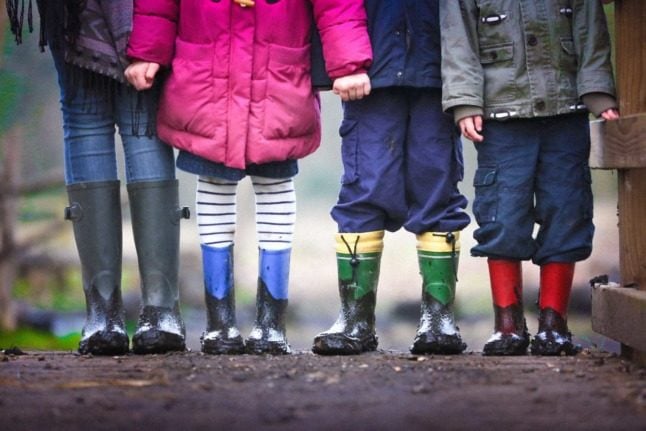Whether saving to help your kids at university, for a deposit on a home or just a little extra cash to help them out as they leave the nest, parents will often want to create a fund with their kids’ future in mind.
And while savings funds tend not to provide the best return over the longer term in comparison to other forms of investment, banks will often offer better than usual rates on children’s accounts.
They do this partially because they know how loyal/lazy people can get with a bank account, so making it worthwhile for parents to set one up for their kids may mean they are getting a customer for life.
That said, not all banks will offer great deals and not all accounts are the same.
Here’s what you need to know about setting up an account for your kids (or grandkids) in Switzerland.
What to think about when investing for your kids?
There are a number of things to consider when looking at setting up an investment fund or account for your kids.
While a strong return may be the most important factor to consider, other factors may include low-risk, accessibility (or lack of accessibility) and teaching your kids responsible savings habits.
READ ALSO: Cost of living – How to save on groceries in Switzerland
Generally speaking, gift or savings accounts are a lower risk option although the returns will also be lower.
Setting up an investment fund for your children may be higher risk, but is likely to net you a higher return.
Also as the investment will not realise itself for the best part of two decades, you don’t need to concern yourself with regular fluctuations.
What are gift and savings accounts for young children?
Set up by parents for their children, gift accounts (German: Geschenkkonten/Geschenksparkonto, French: compte epargne cadeau) are special accounts with certain benefits.
When the child turns 18 (or another age specified under the agreement), the account is under their control. Sometimes, banks will present vouchers or ceremonial certificates to a child once the account becomes theirs.
Generally, the interest rates will be higher and there will be other benefits, such as no bank fees, free bank cards etc.
These accounts also tend to have special rules, as they are set up to benefit the child. The rates may only kick in when there are regular deposits, for instance, one per year (on the child’s birthday or Christmas).
READ ALSO: Cost of living in Switzerland – How to save money if you live in Zurich
As the accounts are directed at children, the higher interest rates may have a limit.
Several cantonal banks, for instance, will pay a higher 0.5 percent interest rate until the balance is CHF25,000, after which the interest rate drops to 0.05 percent.
Credit Suisse’s ‘Viva Kids’ account has a higher interest rate of five percent, although this becomes 0.5 percent once the balance crosses CHF1,000. A parent must have at least one Credit Suisse account to open a Viva Kids account.
Another, the Credit Agricole Next Bank, provides 1.5 percent interest up to CHF50,000, although a parent must already have an account at the bank.
The fees are also worth considering as they are relatively expensive at CHF180 per year, unless you have a balance over CHF20,000, in which case the fees are waived
This can mean that withdrawals are prohibited (until the child becomes 18) or that withdrawals can only take place for certain things, such as expenses related to the child.
Overdrafts are either not allowed or heavily penalised, while strict notice periods may be in place.
Deposits are protected by insurance up to the balance of CHF100,000 (if the bank becomes insolvent, for instance) which is the same for most savings accounts in Switzerland.

What about savings funds for my kids?
Another popular option is a savings fund for your kids (German: Fondskonto, French: compte de fonds).
The NZZ newspaper writes that the returns here “are significantly higher than on a savings account”.
EXPLAINED: How to find cheap train tickets in Switzerland
The returns in place at any point in time can of course change without notice, although remember that this is a long-term investment so you should be less concerned about daily fluctuations as you are about other things within your control, like the fees a bank chooses to impose on your account.
Martin Spieler, from Switzerland’s Tages Anzeiger Geldblog, says these accounts are particularly suited for people who want to make regular contributions.
“By not investing all your money only at a certain point in time, but by investing regularly and acquiring fund units regularly, you do not run the risk of having bought when the prices were at their highest.”
These also tend to have higher fees than bank accounts – think around two percent per annum compared to no cost for many children’s savings accounts.
One major thing to consider is the time until maturity (of both the investment account and your children).
If you don’t make the investment when the child is born but instead make it later, for instance when they start high school, the return may be lacking – and a simple savings account may be a better approach.
As the NZZ writes “It is crucial not only to consider the fund fees, but really the entire costs for the custody account, the transactions and the funds. Ultimately, it is advisable to only open a fund depot if you want to keep the money invested for the children or grandchildren for at least 10 years.”
How much access do parents have?
Some options provide zero access for parents (other than making deposits) until the child is 18, while others provide parents with complete control.
While investment funds can usually be set up any way you want them to, bank accounts for children will have relatively defined rules.
Some accounts let the parents withdraw when they choose, while others will ask for evidence – such as receipts – that the expenditure will actually be in the child’s benefit.
READ MORE: Does marriage make financial sense in Switzerland?
Raiffeisen for instance will ask for evidence (i.e. receipts) that the money is being used for the child. Postfinance will only act in the case of misuse, while Credit Suisse leaves the parents in control of any withdrawals they want to make.
Generally the account will be under the control of the child when they turn 18, although some accounts – particularly at cantonal banks – will let the age limit be set at 21 or 22.
Which should I choose?
The right choice for you can only be made when you ask what you want from a savings account.
The Viva Kids account for instance has high returns on low amounts.
This might be unsuitable for someone wanting to provide big investment gains for their children, but the high returns may create a positive relationship to saving money for your kid that will benefit him or her throughout their life. A high-risk, high-return account may have the opposite effect.
‘A developing country’: Why do so few Swiss children attend childcare?
The options for early withdrawal are also worth considering, for instance if you want to make a contribution from the account to the child’s education before they turn 18.
Most large Swiss banks will have information in English and someone you can talk to about options. This may be more difficult at cantonal banks, but these are also worth considering as they have some of the best options for children’s accounts.
Before making a decision, check out an independent comparison site like Comparis or Moneyland, who will often do updated reports on interest rates and fees at the country’s leading banks.
This summary, from Moneyland in late 2021, provides a useful overview of interest rates and fees.
Please note: As with any reports of a financial nature presented on this site, this is intended as a guide only and should not take the place of accredited financial advice.




 Please whitelist us to continue reading.
Please whitelist us to continue reading.
Member comments